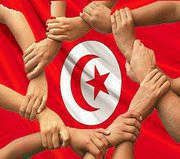"Every Arab leader is watching Tunisia in fear. Every Arab citizen is watching Tunisia in hope and solidarity."
--From the Sidibouzid Twitter feed
Last year when a friend's college-age daughter was awarded a scholarship to spend the summer studying Arabic in Tunisia, I had to admit my own knowledge of the North African nation was limited. What impressions I did have were of a stable, politically quiescent nation, known more on the world stage for its beautiful Mediterranean beaches and tourist industry than its authoritarian government.
Indeed, President Zine El Abidine Ben Ali enjoyed a carefully crafted image in the West as a forward-looking ruler, despite what political scientists might describe as his "democratic deficits." He was a modernizer who promoted women's rights and didn't like Islamic radicals. In recent years, Ben Ali had even permitted a handful of weak opposition parties to occupy seats in parliament.
Of course, there was always that nagging question: What kind of democracy is it when the president regularly receives over 90 percent of the vote in elections? The latter reality either made Ben Ali one of the world's most popular leaders over the last 23 years, or just another authoritarian strongman whose formal beneficence toward civil society reflected only the latter's inability to challenge his dictatorial rule.
All that is history now. Armed with growing courage and solidarity, the Tunisian people in their many thousands repeatedly took to the streets over the past month, steadfast in voicing their desire for jobs, democratic freedoms, and an end to corruption and class privilege. From the government came false appeasements the people no longer believed, as well as open threats they did believe--police snipers on rooftops, shooting down their own people in cold blood.
Last Gasps from the Rotting Edifice
The last day for Ben Ali's rule unfolded at an extraordinary pace. The morning began with about 200 people demonstrating outside the Interior Ministry building in central Tunis, says Youssef Gaigi, a Tunisian activist and blogger in an on-scene phone interview that day with Al Jazeera.1 As word quickly spread through the city of the peaceful crowd gathering in front of the ministry, the floodgates opened. From across Tunis thousands of people began to arrive at the ministry building, demanding the president's resignation.
Tellingly, the President's televised speech the night before had promised an end to media censorship and more democratic reforms. While such rhetoric might have played well for the international media, at home it was no longer working. "The president just repeated the same speech he made in 1987 when he was sworn," Gaigi told Al Jazeera. "'We will be a democratic country, we will offer you freedom,' but we know it is not honest."
More critically, Ben Ali's last-ditch effort to stay in power included a promise for an end to police shooting live ammunition at demonstrators. But as Gaigi and others reported, everyone knew gunfire could still be heard overnight in Tunis. That afternoon as it became clear the crowd of 40,000 would not disperse until it had gotten what it came for--the president's resignation, security forces moved in with tear gas and clubs.
Instead of restoring order, however, the resulting confrontation only accelerated what was quickly becoming inevitable--Ben Ali's ouster. Within hours state media broadcast the dismissal of the government, followed shortly after by the stunning announcement that the President had fled the country. Fittingly, the old dictator was on his way to the safe haven of the Saudi dictatorship.
Interim President Fouad Mebazza, the speaker of parliament, has since announced a new coalition "unity" government to include opposition leaders, with a new presidential election promised within six months. The six opposition parties represented in the Chamber of Deputies include the Social Democratic Movement, Popular Unity Party, Union of Democratic Unionists, Liberal Social Party, and the Green Party.
Meanwhile, the streets of Tunis remain tense. The dictator's presidential security force of 1,000 armed men appears responsible for much of the street violence, according to many reports, shooting at buildings and people from unmarked cars in a chaotic campaign of terror to induce chaos. On Sunday a pitched gun battle was reported between police and soldiers near the presidential palace in suburban Carthage. Notably, General Ali Seryati, a former security chief and senior advisor to Ben Ali, was arrested over the weekend after being detained by civilians.
(Note: You can view every article as one long page if you sign up as an Advocate Member, or higher).





